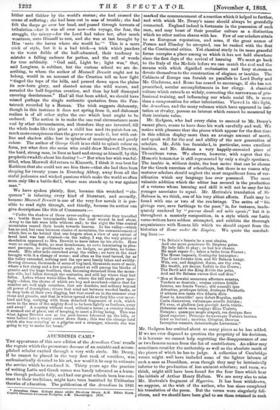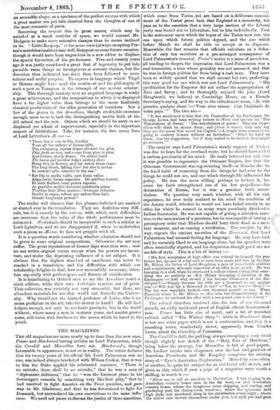ARUNDINES Tan appearance of this new edition of the Arundines
Cami recalls the regrets which the premature decease of an amiable and accom- plished scholar excited through a very wide circle. Mr. Drury, if he cannot be placed in the very first rank of versifiers, was enthusiastically devoted to his art, nor would it be easy to estimate the service which he rendered it. Thirty years ago the practice of writing Latin and Greek verses was barely tolerated as a harm- less though pedantic folly, and had our great schools been less con- stant to their traditions, might have been banished by Utilitarian theories of education. The publication of the Arundines in 1841
• Aningbess Cowl. Collesit signs edidit Henrietta Drury, A.M. Editio Seats. Curnvit Hsluious Johannes Hodgson, A.M. Cantsbrigits. 1865.
marked the commencement of a reaction which it helped to further, and with which Mr. Drury's name should always be gratefully connected. England indeed is fortunate in the possession of such men, and may boast of their peculiar culture as a distinction which no other nation shares with her. Few of our scholars attain to an European reputation, and none, if the great names of Porson and Elmsley be excepted, can be ranked with the first of the Continental critics. Yet classical study in its more graceful forms occupies a place among us which it has not held elsewhere since the first days of the revival of learning We must go back to the Italy of the Medicis before we can match the zeal and the success with which dignified ecclesiastics and busy statesman devote themselves to the construction of elegiacs or iambics. The Cabinets of Europe can furnish no parallels to Lord Derby and Mr. Gladstone, and Rome has ceased to encourage, if she has not proscribed, secular accomplishments in her clergy. A classical culture which extends so widely, correcting the narrowness of pro- fessional training, and influencing our whole social life, is more than a compensation for other inferiorities. Viewed in this light, the Arundines, and the many volumes which have appeared in imi- tation or rivalry, possess an interest which cannot be measured by their intrinsic value.
Mr. Hodgson, who had every claim to succeed to Mr. Drury's vacant place, seems to have done his work carefully and well. We notice with pleasure that the pieces which appear for the first time in this edition display more than an average amount of merit, and speak well for the zeal and ability of the new generation of scholars. Mr. Jebb has furnished, in particular, some excellent iambics, and Mr. Holmes a very happily-executed piece of Theocritean verse.. We observe, however, with regret that the Homeric hexameter is still represented by only a single specimen. The iambic is, without doubt, the best metre that can be chosen for the Greek exercises of schoolboys, but there is no reason why maturer scholars should neglect the most magnificent form of ver- sification which any language has ever possessed. The most valuable addition which the editor has secured is the production of a veteran whose learning and skill it will not be easy for his younger associates to equal. Mr. Merivale's translation of Sir Balaam is, we think, one of his very ablest efforts. Fault may be found with one or two of the renderings. The satire of " his givings rare, save farthings to the poor," is, for instance, inade- quately rendered by " parcus dandi sed mitts egenis r but it is throughout a masterly composition, in a style which our Latin verse-writers have seldom attempted, and exhibits the thorough acquaintance with Roman life which we should expect from the historian of Rome under the Empire. We quote the conclud- ing lines :—
" In Britain's Senate he a seat obtains, And one more pensioner St. Stephen gains. My lady falls to play ; so bad her chance, He must repair it ; takes a bribe from France ; The House impeach, Conin,gsby harangues; The Court forsake him, and Sir Balaam hangs. Wife, son, and daughter, Satan, are thy own, His wealth, yet dearer, forfeit to the Crown ; The Devil and the King divide the prize, And sad Sir Balsam curses God and dies."
"Mom et Romulei scamnum affectare sonatas, Venders se dominis conjus certare fritillo Interea, nee Lusts Venus; sibi consulit ipso Attonitus, pretioque inhiat, donisque Phrahatis.
0 ntinam non tants vire fiducia diris Esset in Arsacidis ! mom defect Regulus, audit Curia elamantem, vultumque avertit Atrides ; Fit rens, of gladium jam porrigit Arria tristis.
Debentur sa3vis cum conjuge filius Umbria, Natacine; quamque magis stupnit, res denigne Saco
Quod sup3rest ; Princops damnosaque Tartara lucruin
Inter se facinut ; moriens, Crispin, Deorum Inerepitas numero, detestarisque Lavernam."
Mr. Hodgson has omitted about as many pieces as he has added. If we are ever disposed to question the propriety of his decisions, it is because we cannot help regretting the disappearance of one or two famous names from the list of contributors. An editor may sometimes consider the authorship as well as the absolute merit of the pieces of which he has to judge. A collection of Cambridge verses might well have included some of the lighter labours of such a man as Donaldson, even though they may be intrinsically inferior to the production of less eminent scholars ; and room, we think, might still have been found for the four lines which bear the initials of Arthur Henry Hallam. We are sorry also to miss Mr. Merivale's fragment of Hyperion. It has been withdrawn, we suppose, at the wish of the author, who has since completed his translation of the poem. But the verses were singularly feli- citous, and we should have been glad to see them retained in such
an accessible shape, as a specimen of the perfect success with which a great master can put into classical form the thoughts of one of the most romantic of poets.
Reserving the respect due to great names, which may be satisfied at a small sacrifice of space, we would counsel Mr. Hodgson to make more extensive changes than he seems inclined to do. "Little Bo-peep," et hoc genus wane (always excepting Poe- son's matchless iambics) may well disappear on some future occasion, though it would have been ungracious in a new editor to displace the special favourites of his predecessor. Five-and-twenty years ago it was justly considered a great feat of ingenuity to put into passable verse things so incongruous as nursery rhymes, but the direction thus indicated has since then been followed to more serious and useful purpose. To express in language which Virgil or Horace might have used the sentiment and the philosophy of such a poet as Tennyson is the triumph of our newest scholar- ship. This thorough mastery over an acquired language is really a great achievement, and the compositions in which it is displayed have a far higher value than belongs to the more faultlessly classical productions of the older generation of versifiers. Not a few of the pieces in the Arundines, though creditable exercises enough, seem to 113 to lack the distinguishing merits both of the old school and the new. Others which we should be sorry to see displaced yet admit of improvement, especially in the important respect of faithfulness. Take, for instance, the first seven lines of Lord Lyttelton's wee :- "There lies a sale in Ida, lovelier
Than all the valleys of Ionian hills.
The swimming vapour slopes athwart the glen, Puts forth an arm, and creeps from pine to pine, And loiters, slowly drawn. On either hand The lawns and meadow ledges midway down Hang rich in flowers, and far below them roars The long brook, falling thro' the clov'n ravine In cataract after cataract to the sea."
"Est Ida in media vallis, quot Ionia vanes Alma fovet, forma superans. Ibi saltibus harent, Et lenti fluitant inter pineta vaporer.
At gravidos mania decoraut pendentia prate Floribus hinc illine montos rivusque reductas Desilit in rapes, reboat qua anfractibus imis, Oceani longinqua patens."
The reader will observe that the phrases italicized are omitted or slurred over in the translation. They are doubtless very diffi- cult, but it is exactly by the success with which such difficulties are overcome that the value of the whole performance must be estimated. No obstacle should be insuperable to such a scholar as Lord Lyttelton, and we are disappointed if, when he undertakes such a poem as YE tone, he does not grapple with all.
It is a question worth considering whether admission should not be given to some original compositions. Otherwise the art may suffer. The great reputations of former days were thus won ; now no one writes original verses except when his powers are imma- ture, and under the depressing influence of a set subject. It is obvious that the highest standard of excellence can never be reached in a translation, and the difficulties with which our scholarship delights to deal, however successfully overcome, inter- fere especially with perfect grace and fluency of versification.
It is humiliating to Oxford men to see the Are tdines reach a sixth edition, while their own Enthoiogia remains out of print. That collection was certainly not very successful, but there are abundant materials for one that would not discredit the Univer- sity. Why should not the learned professor of Latin, who is no mean proficient in the art, take the matter in hand? He will find helpers enough, not only in academic precincts, but in the world without, where many a man in maturer years, and amidst graver
cares, still turns with fondness to the muses which he loved in his youth.































 Previous page
Previous page